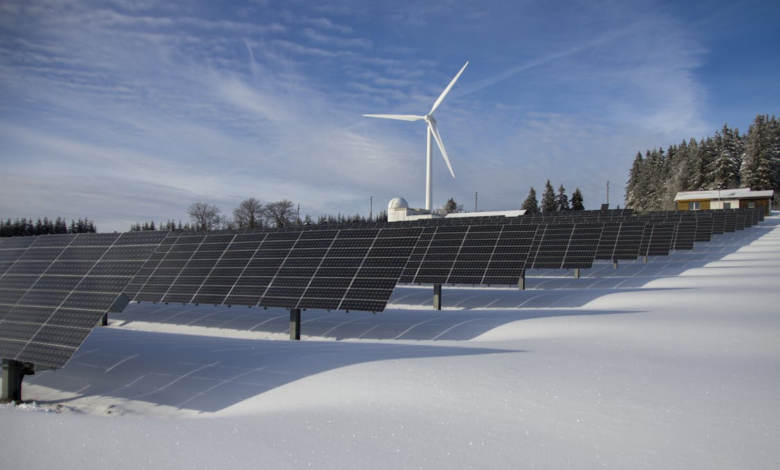Can Solar Panels Work During Cloudy Weather?

A common misconception is that solar panels only work in direct sunlight, but this isn’t entirely true. Solar panels can still produce electricity on cloudy days, although their output may be reduced. In fact, even in overcast conditions, the panels capture diffused sunlight and continue generating power. As more people seek out environmentally friendly energy, understanding how solar panels perform in various weather conditions becomes crucial. In this article, we’ll explore how solar panels function during cloudy weather and what factors can impact their efficiency.
How Solar Panels Generate Energy
Solar panels convert sunlight into electricity through a process called the photovoltaic (PV) effect. When sunlight hits the panels, photons (light particles) excite electrons within the photovoltaic cells, generating an electric current. What’s important to know is that solar panels don’t need direct sunlight to work. They can capture energy from visible light, which is still present on cloudy days. Factors like the angle of the panels, shading from trees or buildings, and even dirt on the surface can affect how well solar panels perform in cloudy weather.
Solar Panels and Cloudy Weather: What Happens?
On cloudy days, solar panels produce less energy than on sunny days, but they don’t stop working. While direct sunlight provides the most power, diffused sunlight that passes through clouds can still be converted into electricity. In general, solar panels may generate 10-25% of their typical energy output during overcast conditions, depending on cloud thickness. Despite this drop, modern solar panels are designed to operate efficiently even when the weather isn’t ideal, ensuring a steady, though reduced, supply of electricity.
Types of Solar Panels Better Suited for Cloudy Conditions
Not all solar panels are created equal, especially when it comes to performance on cloudy days. Monocrystalline solar panels are known for their efficiency and perform better in low-light conditions, making them a good choice for areas with frequent clouds. Polycrystalline solar panels, while more affordable, are slightly less efficient but still reliable. Thin-film solar panels are flexible and perform decently in diffused light, though they generally have lower efficiency overall. Choosing the right solar panels for your specific climate is key to maximizing energy production.
Real-World Performance in Cloudy Regions
Countries like Germany and the UK have seen widespread adoption of solar panels, despite having more cloudy days than sunny ones. In fact, Germany leads the world in solar energy production, showing that solar panels can still be effective in regions with frequent overcast skies. Cities like Seattle and Vancouver, which are known for their cloudy climates, also see success with solar power. Even though cloudy conditions reduce energy output, solar panels in these regions still generate enough electricity to make them a viable, environmentally friendly energy solution.
Technologies That Improve Solar Performance in Cloudy Weather
Several technologies help boost the efficiency of solar panels in less-than-ideal weather conditions. Bifacial solar panels can capture light from both sides, making them more efficient in low-light environments. Solar tracking systems adjust the angle of the panels throughout the day to maximize exposure to available sunlight, even when it’s cloudy. Additionally, microinverters optimize power output at the individual panel level, ensuring that even on cloudy days, solar panels operate at their best. Energy storage solutions like batteries can also help store excess energy generated on sunnier days for use when it’s cloudy.
Benefits of Solar Panels in Cloudy Regions
Even in regions with cloudy weather, solar panels provide significant long-term benefits. They help reduce energy bills, lower dependence on fossil fuels, and decrease carbon footprints. Many governments offer financial incentives and tax breaks for installing solar panels, making them an attractive option even in areas with less sun. Over time, the efficiency and cost-effectiveness of solar panels make them a smart investment, even if they don’t operate at full capacity every day, especially when compared to evaluating what is a good natural gas rate.
Myths About Solar Panels and Cloudy Weather
A common myth is that solar panels don’t work at all during cloudy weather. This isn’t true—solar panels still capture and convert diffused sunlight into electricity, though at reduced efficiency. Another misconception is that cloudy regions aren’t suited for solar panels, but as we’ve seen in places like Germany and Seattle, solar panels can still produce enough energy to make them worthwhile. Understanding how solar panels operate in various weather conditions helps debunk these myths and encourages more people to consider solar energy.
In Conclusion
Solar panels are a reliable source of energy even during cloudy weather. While their efficiency may decrease, they continue to produce electricity, making them a viable option in a wide range of climates. Technologies like bifacial panels, tracking systems, and microinverters help enhance their performance in low-light conditions. For regions with frequent cloud cover, solar panels are still an environmentally friendly energy solution that reduces reliance on non-renewable sources. Consulting professionals to choose the right solar panels for your area can ensure maximum energy production and long-term benefits.




